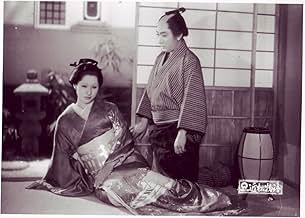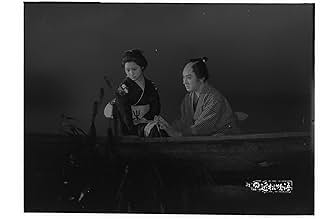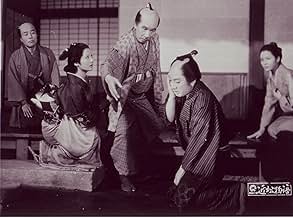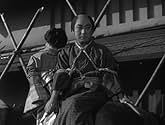IMDb RATING
8.0/10
5.3K
YOUR RATING
Ishun is a wealthy but unsympathetic master printer who has wrongly accused his wife and best employee of being lovers. To escape punishment, the accused run away together, but Ishun is cert... Read allIshun is a wealthy but unsympathetic master printer who has wrongly accused his wife and best employee of being lovers. To escape punishment, the accused run away together, but Ishun is certain to be ruined if word gets out.Ishun is a wealthy but unsympathetic master printer who has wrongly accused his wife and best employee of being lovers. To escape punishment, the accused run away together, but Ishun is certain to be ruined if word gets out.
- Awards
- 1 win & 2 nominations total
Eitarô Ozawa
- Sukeemon
- (as Sakae Ozawa)
8.05.3K
1
2
3
4
5
6
7
8
9
10
Featured reviews
Nothing is more unpredictable than a person's fate
Set in 17th century Japan, and based on a 1715 play by Chikamatsu Monzaemon (hence the title, 'A Story From Chikamatsu'), this film starts with a rich scroll-maker (Eitarō Shindō) refusing to give his wife (Kyōko Kagawa) money. When she turns to one of his top apprentices (Kazuo Hasegawa), she sets in motion of a chain of events that ultimately have them fleeing together, because the apprentice, normally a virtuous man, intended to take the money from the scroll-maker and was caught.
The story reveals emotion and desire that is both on the surface, such as the scroll-maker sexually harassing a young servant (Yōko Minamida), as well as that which is concealed. It shows us the randomness of events which may cause everything to suddenly change in one's life; as the wife puts it at one point, "Nothing is more unpredictable than a person's fate. In just one day, all of this has happened to us." If you've ever had your life flip suddenly because of love, you'll identify.
The film also shows the all-too-common fate of women; the advice given to the young servant being harassed is to "Just take it. That's the duty of an employee." Adultery is also blamed first and foremost on the women ("It's frightening what women are capable of"), and it's ominous when a couple of adulterers are being led through the town to be crucified early on in the film.
It's a solid film throughout – the cast is strong, the story is well told, and there are some gorgeous scenes, one of which is in a bamboo forest. I don't think it's going to blow you away, but it's a good one.
The story reveals emotion and desire that is both on the surface, such as the scroll-maker sexually harassing a young servant (Yōko Minamida), as well as that which is concealed. It shows us the randomness of events which may cause everything to suddenly change in one's life; as the wife puts it at one point, "Nothing is more unpredictable than a person's fate. In just one day, all of this has happened to us." If you've ever had your life flip suddenly because of love, you'll identify.
The film also shows the all-too-common fate of women; the advice given to the young servant being harassed is to "Just take it. That's the duty of an employee." Adultery is also blamed first and foremost on the women ("It's frightening what women are capable of"), and it's ominous when a couple of adulterers are being led through the town to be crucified early on in the film.
It's a solid film throughout – the cast is strong, the story is well told, and there are some gorgeous scenes, one of which is in a bamboo forest. I don't think it's going to blow you away, but it's a good one.
The tortured heart behind the cultivated image
This is adapted from a work by Chikamatsu Monzaemon, one of the defining writers from the early Tokugawa era. His name often reaches us in the contours of a Japanese Shakespeare and as usually with these Western imports to explain Eastern art, it is mostly a lazy comparison. Unlike Shakespeare who continues to inspire a steady flow of film, Chikamatsu's name has been largely neglected however; there is this, and films by Uchida, Shinoda, and Yasuzo Masumura, 'shunji'/double-suicide stories that were Chikamatsu's forte, each enlivened in its own way by the intensity of vibrant artifice and a story of forbidden passions cleansed by death.
So film-wise, the heart of these things has been extrapolated from where centuries of concentrated practice refined them, in the stages of kabuki or bunraku, both of which featured elaborate contraptions for generating illusions. The stage having been set, it was all a matter of achieving a cinematic mobility around it. Shinoda made the most clever simple use of that stage in Double Suicide; he was essentially filming what domestic audiences had enjoyed for centuries on the stage of bunraku as part of unbroken tradition, but trusting our eye to be naturally dislocated the right distance to absorb this as a puzzling modernity.
It is not unlike what has happened with Mizoguchi; a visual purity from tradition dislocated, thus obscured, through Western interpretations.
But let's backtrack a little. We know that Chikamatsu abandoned kabuki for the puppet theater of bunraku, an author's theater, with pliable actors held on strings and the gods that move the world made visible. There he worked in favour of better integrated audience manipulation, in favour of an idealized realism sprung from the author's mind.
So here we have a film about a scroll-maker, himself an artist charged with cultivating idealized images, fighting against the idealized reality he has helped cultivate in a quest for the true love he had all his life sublimated into perfect service.
It is very similar to Oharu in this way; the film structured around the tension that rises from characters performing idealized roles and the tortured heart that gives rise to them. There is a master printer who cultivates the image of the noble benefactor but who is a cruel deceiving scumbag. Nobles who act magnanimous in the open but then use their position to barter for money. The rival printer who feigns congratulations or compassion but who is secretly plotting for the imperial position.
So this idealized world that Chikamatsu advocated and in a small part helped cultivate, Mizoguchi posits to be a system of organized oppression with victims its own characters.
But it is in thrusting through this world of idealized, thus largely fictional appearances, that the two lovers can finally realize feelings that were socially prohibited. In this fictional world true beauty, a love fou, is realized by shedding the artificial. As it turns out, the two of them become the couple they were groomed to be.
As usual with Mizoguchi, the narrative on the surface level is never less than obvious. It is clean, disarmingly earnest. It seems like the film does not demand anything of us. But beneath the controlled histrionics, there is a heart of images that beats with abstract beauty.
The final image is of the two lovers publicly declaring love by simply standing together. It is again clean but resonates outsid the narrative. Their fate is sealed, but the image no longer cultivated but naturally arisen now has the chance to blossom across the audience of curious onlookers. It is an image with the power to inspire change.
Mizoguchi is not a filmmaker I can deem personal. But he's a remarkable study just the same.
So film-wise, the heart of these things has been extrapolated from where centuries of concentrated practice refined them, in the stages of kabuki or bunraku, both of which featured elaborate contraptions for generating illusions. The stage having been set, it was all a matter of achieving a cinematic mobility around it. Shinoda made the most clever simple use of that stage in Double Suicide; he was essentially filming what domestic audiences had enjoyed for centuries on the stage of bunraku as part of unbroken tradition, but trusting our eye to be naturally dislocated the right distance to absorb this as a puzzling modernity.
It is not unlike what has happened with Mizoguchi; a visual purity from tradition dislocated, thus obscured, through Western interpretations.
But let's backtrack a little. We know that Chikamatsu abandoned kabuki for the puppet theater of bunraku, an author's theater, with pliable actors held on strings and the gods that move the world made visible. There he worked in favour of better integrated audience manipulation, in favour of an idealized realism sprung from the author's mind.
So here we have a film about a scroll-maker, himself an artist charged with cultivating idealized images, fighting against the idealized reality he has helped cultivate in a quest for the true love he had all his life sublimated into perfect service.
It is very similar to Oharu in this way; the film structured around the tension that rises from characters performing idealized roles and the tortured heart that gives rise to them. There is a master printer who cultivates the image of the noble benefactor but who is a cruel deceiving scumbag. Nobles who act magnanimous in the open but then use their position to barter for money. The rival printer who feigns congratulations or compassion but who is secretly plotting for the imperial position.
So this idealized world that Chikamatsu advocated and in a small part helped cultivate, Mizoguchi posits to be a system of organized oppression with victims its own characters.
But it is in thrusting through this world of idealized, thus largely fictional appearances, that the two lovers can finally realize feelings that were socially prohibited. In this fictional world true beauty, a love fou, is realized by shedding the artificial. As it turns out, the two of them become the couple they were groomed to be.
As usual with Mizoguchi, the narrative on the surface level is never less than obvious. It is clean, disarmingly earnest. It seems like the film does not demand anything of us. But beneath the controlled histrionics, there is a heart of images that beats with abstract beauty.
The final image is of the two lovers publicly declaring love by simply standing together. It is again clean but resonates outsid the narrative. Their fate is sealed, but the image no longer cultivated but naturally arisen now has the chance to blossom across the audience of curious onlookers. It is an image with the power to inspire change.
Mizoguchi is not a filmmaker I can deem personal. But he's a remarkable study just the same.
Elegant and methodical
"Chikamatsu Monogatari" (Crucified Lovers) (Japanese, 1954): Set in 17th century Japan, a series of honorable gestures begins to go terribly wrong, and takes victims with them. Did you know that adulterers at that time were crucified in Japan? This and many more traditions of the Old Way were up for reexamination by the Japanese culture soon after their defeat in World War II. This must have been a time of great doubt for them after all, wasn't it their past that lead them to their current condition? "Chikamatsu Monogatari" is an elegant, methodical story with tragic twists and turns that never the less head straight into inflexible Fate.
One of the key films in all of Japanese cinema
"Chikamatsu Monogatari" , (aka "The Crucified Lovers"), is one Mizoguchi's lesser known works and yet it is no less extraordinary for all that. It is, of course, typical of its director; another tragic tale of corrupted innocence and the terrible hand fate plays in people's lives, in this case a wrongful accusation of adultery over a very simple misunderstanding. Shakespeare could have written this.
It's set in the 17th century and it paints as relentless a picture of cruelty and hypocrisy as Mizoguchi has given us and he shoots it almost in semi-darkness, (even the exteriors take place at night or are shrouded in mist or in shadow), so there is no escape for its protagonists nor for us; the inevitability of the lovers' fate is clearly signposted from the beginning.
As the couple forced to acknowledge their love for each other by unfolding events Kazuo Hasegawa and Kyoko Kagawa are superb, particularly Kagawa whose performance as the wronged wife is a masterclass in subtlety and tenderness. This is surely one of the key films in all of Japanese cinema.
It's set in the 17th century and it paints as relentless a picture of cruelty and hypocrisy as Mizoguchi has given us and he shoots it almost in semi-darkness, (even the exteriors take place at night or are shrouded in mist or in shadow), so there is no escape for its protagonists nor for us; the inevitability of the lovers' fate is clearly signposted from the beginning.
As the couple forced to acknowledge their love for each other by unfolding events Kazuo Hasegawa and Kyoko Kagawa are superb, particularly Kagawa whose performance as the wronged wife is a masterclass in subtlety and tenderness. This is surely one of the key films in all of Japanese cinema.
The best love story on film
I saw this over 20 years ago and I remember it well. Superb photography. Great acting by the 2 leads. How things were different in that era compared to today in Japan. This is probably very hard to find on video if it exists at all. But you may see it in art houses like I did. Another Mizoguchi classic. If you like his work, I recommend The Human Condition, the greatest film ever made.
Did you know
- TriviaThe movie is based on a play by the classic Japanese author Monzaemon Chikamatsu (1653-1725). The original title "Chikamatsu monogatari" means "A Tale From Chikamatsu".
- ConnectionsFeatured in Histoire(s) du cinéma: Toutes les histoires (1988)
- How long is A Story from Chikamatsu?Powered by Alexa
Details
- Release date
- Country of origin
- Language
- Also known as
- The Crucified Lovers
- Production company
- See more company credits at IMDbPro
Box office
- Gross worldwide
- $9,311
- Runtime
- 1h 42m(102 min)
- Color
- Aspect ratio
- 1.37 : 1
Contribute to this page
Suggest an edit or add missing content



































